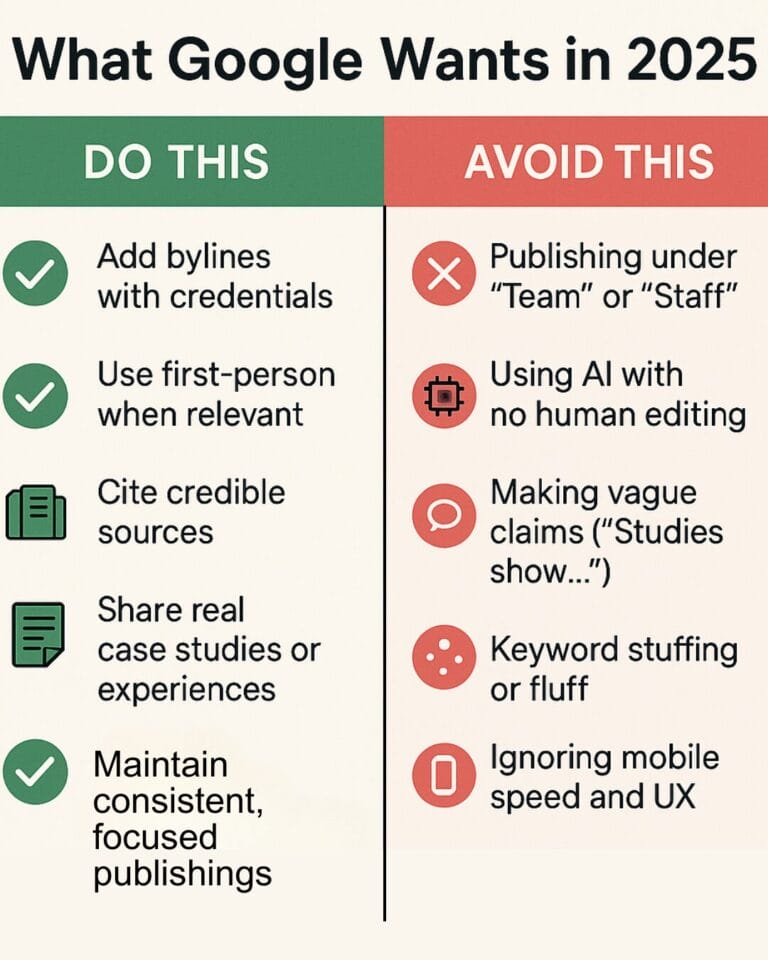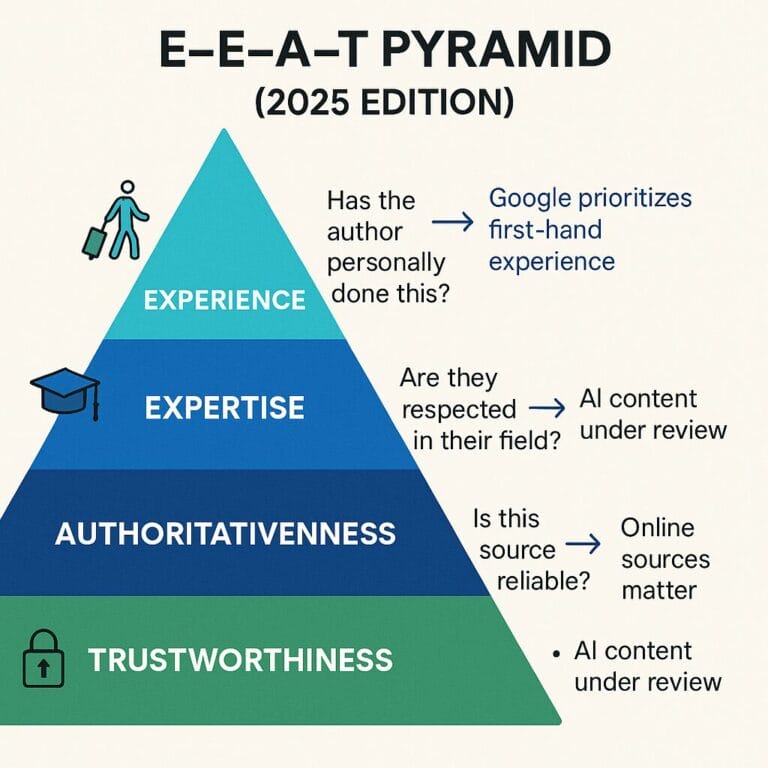If you’ve spent any time around SEO circles, you’ve probably heard the term E-E-A-T tossed around like confetti. But what exactly does it stand for?
Experience, Expertise, Authoritativeness, and Trustworthiness.
These four words guide how Google evaluates the credibility of your content—and by extension, your website. In short, they’re a litmus test for quality. And no, it’s not just something for health websites or legal blogs to worry about. Whether you’re running a baking blog or a B2B software hub, E-E-A-T matters.
Why? Because search engines have one job: deliver content that satisfies users. And in 2025, Google has doubled down. With its most recent updates to the Search Quality Evaluator Guidelines, the focus on E-E-A-T isn’t just alive and well—it’s sharper and more demanding.
So, what’s changed? In a nutshell: first-hand experience now carries more weight, AI-generated content is under a closer microscope, and Google wants real voices behind the information it ranks. If your SEO strategy hasn’t adapted, this might explain why your rankings feel like they’ve slipped into a black hole.
Let’s rewind for a moment.
A Look Back: The Evolution of E-E-A-T
Originally introduced as E-A-T, this framework was a quiet, nerdy whisper in the SEO community—until 2018’s infamous “Medic Update” pulled it into the spotlight. That update hit YMYL (Your Money or Your Life) sites hard, especially those lacking expert credentials or trustworthy sources.
Fast forward to late 2022, and Google added another “E” to the acronym: Experience. That change wasn’t just cosmetic. It signaled a shift in how content is evaluated—not just by what you know, but by whether you’ve actually lived it.
Think about it: Would you rather read travel tips from someone who’s been to Tokyo twice… or from someone who’s read a few blogs and mashed them together using ChatGPT?
Since then, E-E-A-T has quietly influenced every major content-related update Google has pushed. The Helpful Content update, the Product Review update, even the subtle core algorithm tweaks—all have carried the same message:
Write content that’s useful, grounded in truth, and clearly written by someone who knows what they’re talking about.
Of course, Google doesn’t rank pages using an “E-E-A-T score.” But these principles shape how its algorithms interpret content quality—and how real humans (yes, they still use those) evaluate websites behind the scenes.
So, what does this mean for you and your content in 2025? Let’s break that down next.
What’s New in 2025: Google’s Updated Guidelines
If you’ve noticed subtle shifts—or sudden nosedives—in your rankings lately, you’re not alone. In early 2025, Google revised its Search Quality Evaluator Guidelines (SQEG), sending a clear message: surface-level content just won’t cut it anymore.
The updates go beyond small tweaks. They’re a sharper lens for evaluating credibility, authenticity, and how well your content actually meets a reader’s needs. Let’s break down what’s different—and what you need to pay attention to moving forward.
Experience Isn’t Optional
Google has always appreciated expertise. But now, it’s asking: Have you actually done the thing you’re writing about?
Whether you’re reviewing a software tool, explaining how to tile a bathroom floor, or offering financial advice—your personal interaction with the subject matters. The more clearly your content shows that lived experience, the more weight it carries.
This doesn’t mean turning every article into a diary entry. But it does mean weaving in details only someone who’s been there would know.
Credible Authorship and Transparent Sources
Faceless content doesn’t build trust. In 2025, Google has leaned harder into who is behind the information.
This means:
Adding clear bylines with relevant credentials
Linking to full author bios
Citing reliable, traceable sources—no vague “research shows” claims
If you’re thinking, But I’m not a recognized expert, that’s okay. Transparency is the goal here. Show your readers (and Google) why your perspective is worth listening to. Are you drawing from hands-on experience? Industry work? Academic study? Make that visible.
Matching Intent More Precisely
Searchers aren’t just typing keywords anymore. They’re asking nuanced questions and expecting content that gets them—fast.
Google’s recent updates aim to close the gap between what users want and what they find. This means your content should:
Speak directly to specific problems or needs
Reflect the searcher’s context (beginner vs. advanced, consumer vs. professional)
Avoid padding and filler that dilutes relevance
It’s no longer about stuffing keywords or hitting a word count. It’s about making sure each sentence is worth your reader’s time.
AI Content Under Scrutiny
Here’s the elephant in the room: AI-generated content is everywhere. And yes, Google knows.
In 2025, the guidelines now address how reviewers (and algorithms) should distinguish between AI-produced content and writing that reflects genuine experience. That doesn’t mean AI is off-limits. But if your article reads like a remix of the top five Google results with no original insight, don’t expect it to rank.
You can use AI as a helpful assistant. But it can’t replace your voice, your experience, or your critical thinking. And Google’s getting better at spotting the difference.
How E-E-A-T Now Impacts Your SEO Strategy

Let’s be honest—SEO doesn’t always feel fair. You publish something helpful, it vanishes on page three, and some faceless aggregator ranks above you. Frustrating? Absolutely. But 2025’s E-E-A-T updates are shifting the tide in favor of content that actually means something.
So, how exactly does this shift impact your current SEO playbook? Here’s how it breaks down.
Content Creation
This is the heart of it. Google has made it clear: real experience wins.
If you’re still publishing surface-level posts filled with recycled tips, you’re probably watching your traffic slide. Google’s guidelines now reward content that reflects first-hand knowledge—the kind you only get by doing the work.
So what helps?
Personal stories that anchor your expertise in real-life situations
Case studies showing measurable outcomes from your approach
Step-by-step tutorials that prove you’ve done what you’re teaching
Also important: the person behind the words. That means listing named authors, not just “Team” or “Staff.” Those authors need verifiable credentials, even if that just means clearly explaining why they’re qualified to write on a topic.
Don’t overlook:
Detailed author bios with links to professional profiles
A clear About page that signals transparency
Mentions or features on other trusted sites—Google notices those breadcrumbs
You’re not just publishing articles anymore. You’re building a track record of credibility.
Link Building and Authority
Remember the days when a handful of backlinks could lift a site to glory? They’re fading fast. In 2025, quality trumps quantity—and authority has become far more topic-specific.
Here’s what that means in practice:
- Earning links by publishing genuinely useful, insightful content—not content that sounds like everyone else’s
- Building topical authority by covering related subjects in depth, not just in isolation
- Getting recognized as a source through entity-level signals, like consistent naming, branding, and association with your niche
Think less about “link juice” and more about reputation signaling. That’s what Google watches now.
Technical SEO
Even the best content won’t rank if your site gives off sketchy vibes.
Google’s latest updates put more weight on technical trust factors—things that might seem boring, but quietly say: “We’re legit.”
Focus on:
- HTTPS—still non-negotiable
- Clear privacy policies, terms of service, and easy-to-find contact details
- Fast load times, especially on mobile
- Structured data like schema markup for authors, organizations, and articles
These pieces may feel background-level, but together, they help build the overall picture of trust.
AI-Generated Content Considerations
Let’s talk about the robot in the room.
Yes, AI is useful. No, it’s not a free pass to automate your entire blog and expect results. Google’s guidelines now expect editorial oversight, original insight, and content that reads like it was written by someone who gives a damn.
To keep things on track:
- Use AI for outlining, research, or speed—but add your voice, thoughts, and specific experience
- Avoid content that sounds hollow, overly optimized, or stitched together
- Fact-check aggressively, especially when covering health, finance, or anything with consequences
It’s not about avoiding AI altogether. It’s about proving there’s a human behind the screen—one who actually cares what readers walk away with.

Practical Tips to Strengthen E-E-A-T in 2025
Now that you know what E-E-A-T looks like in action, how do you actually apply it to your own site?
The good news: You don’t need to reinvent everything. Small, consistent improvements can have a big impact over time. Here are a few practical, manageable ways to strengthen your E-E-A-T signals—without burning out or breaking your workflow.
Add Clear Bylines with Links to Author Bios
Think of this as digital authorship 101.
Don’t let your content float around anonymously. Every article should feature a byline that links to a detailed author bio page. And that bio? It should say why the person is qualified to write about the topic.
Highlight:
- Relevant experience
- Professional background
- Credentials (formal or practical)
- Links to other work or interviews
Readers and Google both want to know: Who said this, and why should I trust them?
Use First-Person Narratives Where Relevant
You don’t need to turn your blog into a memoir. But a sprinkle of “I” and “we” can go a long way in showing that there’s a human behind the advice.
Examples:
- “I tested this approach for three months and here’s what worked.”
- “We implemented this process at our agency and saw a 40% lift in lead quality.”
These little additions show personal investment—and that’s hard to fake.
Cite Credible Sources, Studies, and Expert Opinions
Everyone has an opinion online. What separates yours is evidence.
Whenever possible, back up your points with trustworthy data. Link to:
- Peer-reviewed research
- Reputable news outlets
- Industry reports
- Statements from recognized experts
Avoid vague attributions like “studies show” unless you’re willing to show the study.
This isn’t about padding. It’s about giving readers a reason to believe you.
Build Brand Authority Through PR, Guest Posts, and Mentions
Earning visibility outside your own site is like a digital vote of confidence.
You can:
Write guest posts on respected sites
Get quoted in expert roundups
Pitch yourself to podcasts, webinars, or local media
Share case studies and client results (with permission)
These appearances often get picked up by search engines—and by the people who trust them.
Encourage Authentic Reviews and User-Generated Content
No one sells your credibility better than someone who’s experienced it.
Make it easy for users to leave:
Product or service reviews
Testimonials
Comments or forum posts that reflect real interaction with your brand
Yes, some feedback might be less than glowing. But the presence of real reviews often helps more than a dozen generic ones. It adds texture. And trust.
Maintain Consistency in Publishing and Topic Focus
You don’t have to publish every day. But your content shouldn’t feel like it was abandoned halfway through an idea either.
Google values:
Regular, thoughtful publishing
Clear topical focus—build depth before chasing breadth
A consistent tone and message across pages
This consistency reinforces both expertise and authority over time.
Common Mistakes to Avoid
Even with the best intentions, it’s easy to trip up. Some missteps happen quietly—others send your rankings into a tailspin. Let’s look at a few frequent offenders that still show up far too often in 2025.
Publishing Anonymous or Generic Content
If your articles read like anyone could have written them… that’s part of the problem.
Google wants to see who created the content. And more importantly, why their insight matters. Publishing without an author—or worse, using a generic byline like “Editorial Team”—raises red flags.
Add real names. Add real bios. It’s a small change with a big impact on trust.
Relying Solely on AI Without Human Oversight
Yes, AI can help. But if you’re copying and pasting raw output into your CMS, expect disappointment.
Content without human review often feels hollow. It might hit keywords, but it won’t resonate with readers—or with Google. AI should serve as a starting point, not the final product.
Add your perspective. Refine the voice. Check the facts. Readers can tell when something’s been phoned in.
Ignoring Site Transparency and User Experience
You could write the best guide on the internet—but if your site feels sketchy, people will bounce. So will your rankings.
Common slip-ups include:
Missing or hard-to-find contact information
No privacy policy or terms
Slow, clunky mobile experience
Pop-ups that attack before the page loads
Fixing these things make your site more trustworthy and more usable. And that’s something both humans and algorithms appreciate.
Conclusion
E-E-A-T has come a long way since it first appeared in SEO conversations. In 2025, it’s no longer a vague concept floating in the background. It’s a central signal for whether your content deserves to rank—or to be quietly ignored.
That may sound like pressure, but it’s also an opportunity. If you’re willing to put in the work—showing experience, citing real sources, building trust—you can stand out in a space crowded with sameness.
So here’s the next step: Audit your existing content.
Ask hard questions about what adds value, what lacks substance, and what deserves more attention. If that sounds like a heavy lift, you don’t have to go it alone.
Book a consultation with V9 Digital Agency and let’s talk strategy—real strategy, built on what works now. We’ll help you turn your content into something that not only ranks—but resonates.
